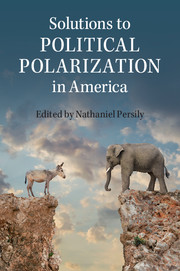Book contents
1 - Introduction
from Introductory Chapters
Published online by Cambridge University Press: 05 May 2015
Summary
The topic of political polarization dominates discussions of contemporary American politics. Commentators may mean different things by the term, but widespread agreement exists that much of the dysfunction in the U.S. political system can be blamed on or explained by polarization. The coarseness of our political discourse, the ideological distance between opposing partisans, and most of all, an inability to pass much-needed and widely supported policies all stem from the polarization in our politics.
This volume assembles several of the nation's top analysts of polarization in American politics. However, unlike the many other volumes written on this subject, this book focuses on solutions to polarization. As such, it necessarily takes these authors, who more often analyze causes and consequences than propose remedies, out of their comfort zone. Debunking conventional wisdom and warning of unintended consequences tend to be more valuable coins in the realm of political science. The professional risks usually exceed the rewards of sticking out one's neck to suggest, with admittedly incomplete information, reforms that might address the most serious policy challenges of the day. We are, therefore, very thankful for the Hewlett Foundation, which helped alter the cost-benefit calculus and supported a conference that produced the chapters for this volume.
The proposals are intentionally brief, readable, and at times, tentative. But each suggests a direction for the country to address the widely maligned claim of polarization in our politics. They range from the mundane (e.g., tweaks to campaign finance laws) to the overly ambitious (e.g., compulsory voting, proportional representation, elimination of primary elections). Recognizing that the U.S. separation-of-powers system is uniquely threatened by polarization, several authors suggest (sometimes fancifully) constitutional change. However, most of the proposals take the basics of our constitutional structure as a given. Still, much can be done short of a constitutional amendment or convention to address the many facets of America's polarization problem.
- Type
- Chapter
- Information
- Solutions to Political Polarization in America , pp. 3 - 14Publisher: Cambridge University PressPrint publication year: 2015
- 14
- Cited by

